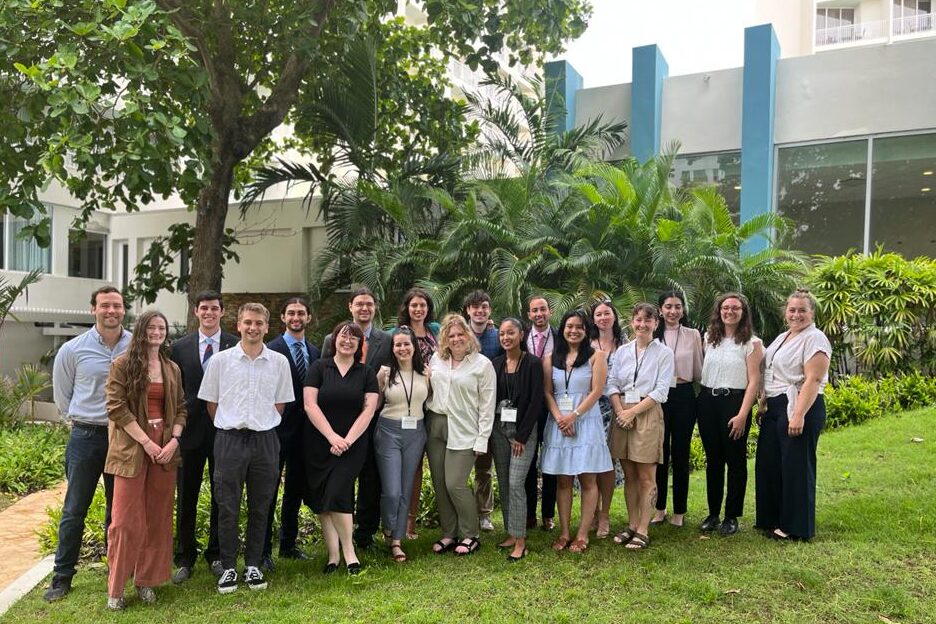The Law and Society Association’s Annual Meeting, a yearly gathering at destinations around the world, is a premier interdisciplinary opportunity for scholars in a range of social science fields to gather and present their work on some of the most pressing challenges of the day. At the 2023 conference, held in San Juan, Puerto Rico, twenty Temple Law students joined leading global thinkers to present their own work as part of Temple’s Law and Public Policy (L&PP) Program.
The students, designated by their participation in the L&PP program as Scholars, addressed five broad themes in their work: Gender, Immigration, Legal Studies, Policing/Criminal Justice, and Economy, Infrastructure, and Equity. Scholar Bri Murphy served as an Official Reporter at the conference and in that capacity will publish a series of posts on the Law & Public Policy blog about the conference and her fellow Scholars’ various contributions. “Temple University Beasley School of Law was represented by twenty brilliant Law & Public Policy scholars at the 47th annual Law & Society Association’s annual meeting and conference,” said Murphy. “The conference itself presented a unique opportunity to not only show the incredible scholarship of Temple’s J.D. candidates, but to meet and exchange ideas amongst some of the leading sociolegal scholars from around the world. The L&PP scholars presented practicable solutions to some of the most pressing issues that arise from the American imperialist legacy of ‘separate and unequal,’ I was proud to be considered among these leaders and look forward to following their scholarship for years to come.”
The theme of the 2023 conference, Separate and Unequal, and its location in San Juan offered a powerful lens through which to explore “the ways that the law normalizes discrimination and inequalities in unincorporated territories like Puerto Rico … and to understand other relationships of power and visions of the relationship between law and society.”
The Scholars were led by adjunct professor and former Scholar Anika Forrest ’17, who also serves as the Legislative Director for Domestic Policy with the Friends Committee on National Legislation. “As an educator and professor accompanying the Scholars at LSA, the highlight for me was the reception of their scholarship,” said Forrest. “I already know Law and Public Policy Scholars are sharp policy analysts and visionaries. Still, the LSA experience affirms that assessment, as one hears the dean of another law school commend a Scholar after her presentation or sees law professors excitedly offer commentary on a Scholar’s proposal, or as legal practitioners approached me to celebrate how inspired the Beasley students were — that speaks to the talent and brilliance of Law and Public Policy Scholars.”
The following Scholars presented their work:
Arlo Blaisus, Voting Registration and Federal Housing Assistance: A Practical Solution to Increase Democratic Participation
Patrick Long, Privacy and Politics: A Case for Increased Federal Campaign Finance Disclosure Thresholds
Lee Kennedy, Exposing the Invisible Middlemen: Regulating Pharmaceutical Benefit Mangers (PBMs) and Promoting Patient-Centered Care
Carson Taylor, Disarming The Stigma: Promoting a U.S. Policy of No First Use
Megan Palmer, Accessible Autonomous Vehicles as a Guideline Not an Afterthought
Max Toth, A Down Payment on American Rail: Reliable Passenger Rail Investment to Correct a Century of Racist Transportation Policy
Samantha Weber, A Sustainable Reform for Western Water Policy: Because No One Wins When We “Use It or Lose It”
Shelby Dolch, Justice Withheld: The Impacts of Bias and Bureaucracy in Executive Clemency on Marginalized Communities
James Dykman, Disarming the Dangerous: Creating a Uniform Disciplinary Policy for Federal Law Enforcement Officer Sexual Misconduct
Amy Kuldip, How Online Communication Platforms Facilitate Human Trafficking and Rethinking the Websites as Hosts Theory
Hanna Pfeiffer, Placing Limits on E-Carceration
Kemberly D. Viveros, Protecting Black Lives Matter Protesters: Mandating Comprehensive Federal Consumer Data Privacy Laws
Carley S. Felzer, A House Divided: Dobbs v. Jackson Women’s Health Organization and the Failed Promise of Separation Between Church and State
Emily M. Harris, LGBTQ+ Inclusive Education: Developing a National Program for Kindergarten through 12th Grade Students
Emily Lawson, A Gender-Affirming Tax Code
Lucas Masin-Moyer, Reconstructing Federal Education Funding Structures and Pennsylvania’s ‘Hold Harmless Model’ of Education to Better Serve English-Learning Students
Joan Fernandez, Twice Exiled: Ending Prolonged Asylee Family Separation
Austin A. Kurtanich, Asylum Application Reform: Supporting Migrants Facing Humanitarian Crisis
Adamari Rodriguez, Immigration Reform: Amnesty a Predated Solution that Advances Economic Development and A Moral Imperative
Marianne A. Uy, Barriers to the American Dream: An Analysis of the International Student Education to Employment Pipeline

